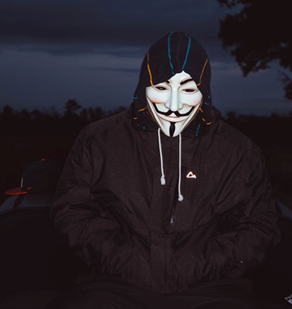
As Halloween approaches, many children and young adults look forward to purchasing costumes and masks to wear for trick-or-treating. Masks have a lot of entertaining and recreational uses, but masks can also aid in mischievous behavior because the wearer can remain anonymous. Did you know that, under certain conditions, it is a crime to merely wear a mask if the intention is to conceal your identity?
Michigan’s first anti-mask law was born in the summer of 1923 when state legislators heard rumors that the Ku Klux Klan (KKK) was becoming a growing presence in rural areas. In the southern United States, Klan members would wear white masks and hoods to terrorize minorities and their sympathizers anonymously. Some legislators were told that KKK organizers were attempting to recruit others into their ranks in Newaygo County. If these Klansman operated with concealed identities, then it would become very difficult to locate and prosecute those offenders that engage in illegal behavior. In response, the Michigan Legislature passed the “Burns anti-mask law”, Act No. 276 of 1923, which became effective on August 29th of that year and read as follows:
- “AN ACT to prevent the wearing of masks or coverings which conceal the whole or any part of the face, in any assembly, march or parade on the streets, highway and public places of this state, except on certain occasions and for certain purposes, and to provide the penalty for violating this act, THE PEOPLE OF THE STATE OF MICHIGAN ENACT:”
- “Section 1: Hereafter it shall be unlawful to assemble, march or parade on any street, highway or public place in this state while wearing a mask or covering which conceals in whole or in part, the fact of the wearer: Provided, This act shall not apply to the pranks of children on Halloween to those going to and from masquerade parties, to those participating in any public parade of an educational, religious or historical character, and to those participating in the parades of minstrel troupes, circuses or other amusement or dramatic shows.”
- “Section 2: Any person who violates any of the provisions of this act shall be deemed guilty of a misdemeanor, and upon conviction thereof shall be punished by a fine of not less than twenty-five dollars nor more than one hundred dollars or by imprisonment in the county jail for a period not exceeding thirty days, or by both such fine and imprisonment in the discretion of the court.”
The language “assemble” is very broad, meaning that two or more people getting together for any purpose while wearing a mask was guilty of a crime. While this was intended to be a deterrence to inciting or criminal behavior, it also had a potential chilling effect on peaceful behavior. In June 2000, in the City of Detroit, protestors participated in demonstrations against the environmental and labor policies of the Organization of the American States (OAS). While the protests were peaceful, the City of Detroit undertook action to suppress the protests by any legal means that they could. When thirteen of the protestors wore Lone Ranger masks to express themselves, they were arrested and charged under Michigan’s then anti-mask laws. In 2001, the American Civil Liberties Union of Michigan and the National Lawyers Guild filed a federal lawsuit against the City of Detroit alleging that the anti-mask law violates the right to First Amendment freedom of expression, due process and equal protection. They viewed the city’s actions in using this antiquated law (originally intended to quash KKK activity) as a threat for exercising the right to free speech, assembly and peaceful protest.
Ultimately, before the federal courts could render a decision, the Michigan Legislature agreed to revise the law and narrow the circumstances that the statute would apply. Effective March 31st, 2003, Michigan’s current anti-mask law reads as follows:
- MCL 750.396 – “A person who intentionally conceals his or her identity by wearing a mask or other device covering his or her face for the purpose of facilitating the commission of a crime is guilty of a misdemeanor punishable by imprisonment for not more than 93 days or a fine of not more than $500.00, or both.”
The amended statute is clear that the anti-mask law would not punish lawful free speech and expression. However, since the legal standard is that the mask was used for “the purpose of facilitating the commission of a crime”, then it does not matter whether the crime was carried out or completed so long that the intent was there. Young people wearing masks for trick-or-treating on Halloween are not in violation of the law. Young people wearing masks on Devil’s Night or Halloween to carry out pranks that may result in malicious property destruction may be guilty of a crime, even if the attempted vandalism was not followed through or successful. Halloween participants, especially those in costume, are encouraged to make good decisions in order to avoid legal entanglements or exposure to the criminal justice system.
If you or a loved one is charged with violating the anti-mask law or any other crime, you will need an experienced criminal defense attorney in your corner. When you require skilled legal representation, do not hesitate to contact the lawyers at Kershaw, Vititoe & Jedinak PLC today.





